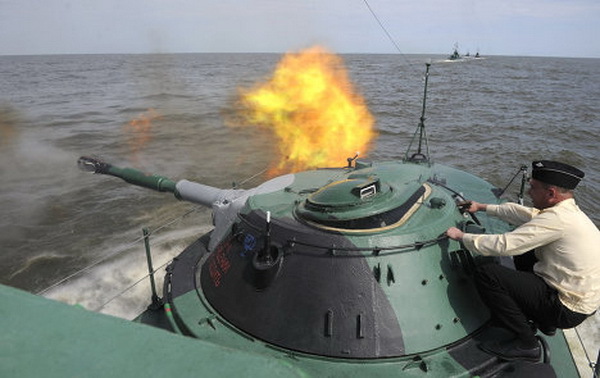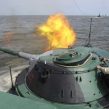
Bluff In Substance, Brutal In Form: Moscow Warns Against Trans-Caspian Project
Publication: Eurasia Daily Monitor Volume: 8 Issue: 217
By:

The Soviet art of socialist realism used to be defined as “socialist in substance, national in form.” Threats to prevent the construction of a trans-Caspian gas pipeline by military force are also a form of Kremlin art: bluff in their substance, even if brutal in their form.
Pursuant to President Dmitry Medvedev and the Russian Security Council’s October 14 decision (see EDM, October 21), Moscow is undertaking diplomatic and political countermeasures to the EU-planned gas pipeline from Turkmenistan to Europe.
Statements by Medvedev and the Russian foreign ministry claiming that trans-Caspian pipelines would be unlawful without Russian consent, have failed to make that legal case, and are seen as purely political. Officially inspired polemics against that project in the Moscow media have also left Ashgabat and Brussels unimpressed. In frustration, Moscow has started hinting at the use of force.
Russian Gas Society president and vice-chairman of the Duma, Valery Yazev (dubbed “Gazprom’s chief lobbyist”), has publicly reminded Turkmenistan that it lacks military protection in the Caspian Sea, and it risks a “Libyan scenario” by joining the EU’s trans-Caspian project. He dismissed the value of UN General Assembly support for Turkmenistan’s neutrality and multivector policy. Instead of “flirting” with the West, Yazev suggested, Turkmenistan should seek Russia’s and China’s protection through the Collective Security Treaty Organization, Eurasian Economic Union, and Shanghai Cooperation Organization (Interfax-Kazakhstan Oil & Gas Weekly Report, November 21).
Outpaced by China in the contest over Turkmen gas resources, Moscow is now concentrating on blocking Western access to those resources. Russia’s semi-official spokesmen use scare tactics by threatening a Caspian repeat of the 2008 Russia-Georgia war.
Mikhail Aleksandrov, department chief at the government-sponsored Institute on the CIS Countries, warns that construction of a trans-Caspian pipeline would imply de facto recognition of division of the Caspian Sea into sectors. “This is altogether unacceptable, and Russia would have to act in the manner of its operation to compel Georgia to peace. This time, Ashgabat and Baku would have to be forced to comply with international law. It may even be through air strikes, if they do not understand any other way.” According to him (echoing Yazev), NATO’s Libya operation gives Russia a parallel right to use force, in this case in the Caspian basin. Aleksandrov claims that he issued these warnings personally to the EU’s Special Representative for Central Asia, the French diplomat Pierre Morel, recently in Moscow (Nezavisimaya Gazeta, November 22).
Konstantin Simonov, head of the government-connected Foundation for Russia’s Energy Security, has similarly warned Turkmenistan, at first via an Azerbaijani outlet: “Ashgabat understands that the situation [with the trans-Caspian project] would be the same as it was in Georgia in August 2008. Back then they promised to protect Georgia, some kind of guarantees. And how did that end… Does Turkmenistan want the same to happen in the Caspian?” (www.news.az, November 11). Simonov went on to warn that “using force is the only possible response” if diplomacy fails to stop the trans-Caspian project. “Ashgabat has no guarantee of protection from a Russian military response. And only the experience of the August war in Georgia is restraining Ashgabat now” (Nezavisimaya Gazeta, November 22).
Medvedev himself has set the stage for using the example of Georgia to intimidate other recalcitrant countries. The outgoing Russian president has just acknowledged the political calculation behind the decision to invade Georgia: namely, to block Georgia’s and Ukraine’s path toward NATO (Interfax, November 22). With this, Moscow stakes out a claim to use force in pursuit of specific political objectives against neighboring countries. Practically on the same day when Medvedev spoke, the Kremlin orchestrated these threats against Turkmenistan (and against EU interests) directly extrapolating from the Georgia example.
Russia is only the third-largest importer of Turkmen gas at present (it ranked first until 2008-2009). Moscow makes no objections to Turkmen gas exports eastward to China or southward to Iran; and it looks favorably at the Turkmenistan-Afghanistan-Pakistan-India pipeline project, which Gazprom even proposes to join as a co-investor. Russia is content to see Turkmen gas heading in any direction except westward to Europe. There, Russia wants to cement its dominant positions.
Turkmenistan and the European Commission envisage deliveries of 40 billion cubic meters of Turkmen gas annually, by the second part of this decade, through the trans-Caspian project and the Southern Corridor to Europe. The Kremlin, apparently, hopes to intimidate Turkmenistan directly, Kazakhstan and Azerbaijan indirectly, scare off the EU, and discourage Western investment in trans-Caspian pipelines.
Using semi-official channels to threaten the use of force is a tactic with limited deniability. It reflects both a sense of impunity and a calculated bluff by Russia’s high-level authorities. It does not deserve a direct response at the public level; this would unnecessarily dignify the bluff.
The proper Western response at this stage is to make clear in Moscow that the trans-Caspian project is a shared Western interest; and to demonstrate this commitment to the Caspian partners.




